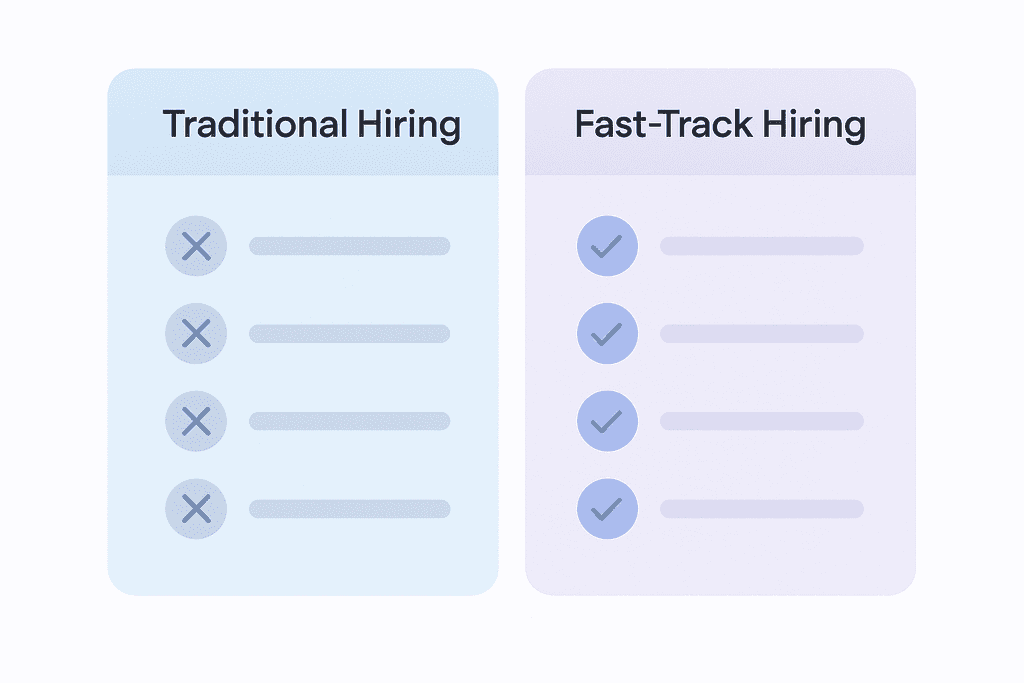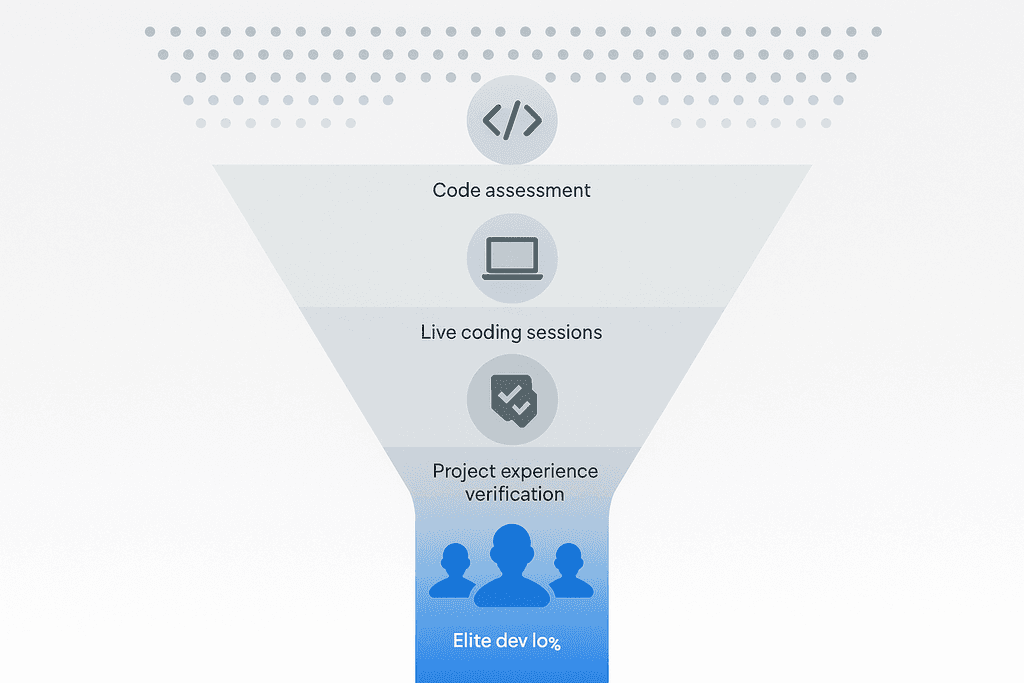
Building a standout digital product requires precision. epicX is your trusted digital product development company for securing top talent. We directly provide product developers ready to transform your ideas into successful, market-ready solutions.








Struggling to find the right people for your digital product? epicX is here to help. Whether you want digital product outsourcing for a full project or need to hire product developers to extend your team, we're the smart choice. Our tailored digital product development services fit your project perfectly.

Building a digital product isn't easy. Challenges can slow you down or derail success. Our pre-vetted product developers address these common pain points directly
We help clarify your product vision. Our teams eliminate guesswork with strong strategic planning to align your goals from the start.
Our team uses an agile approach to cut the time-to-market, delivering product features fast without sacrificing quality.
Our product designers focus on the user. We help you create compelling experiences that really resonate and keep people using your digital product.
Our quality-focused developers act proactively. They build solutions that keep your product lean and ready for future changes.


epicX provides the expert talent you need across the entire digital product development lifecycle. We help you hire product developers who contribute to every stage, from concept to continuous improvement.
Our product development experts offer strategic guidance. They define your project's roadmap and technical approach, ensuring a solid foundation for your digital product.
Building a new SaaS solution? We provide SaaS development specialists. They help engineer scalable, secure, and multi-tenant applications for your product vision.
Bring your app idea to life with skilled mobile talent. We help you hire mobile product developers experienced in creating native iOS and Android or cross-platform applications.
Need a robust web-based product? Our web product development experts build sophisticated platforms. They create engaging and functional digital solutions for various industries.
Design your product for scalability and resilience. Our cloud computing solutions specialists build products optimized for AWS, Azure, or Google Cloud environments from day one.
Make your product smart with data. Our software developers integrate data analytics capabilities, helping your digital product offer deeper insights and better user experiences.
Want to hire senior product developers who truly deliver? Our digital product development services offer direct advantages. We match you with top talent, ready in just 48 hours.
We connect you with truly exceptional product developers. Each expert is rigorously tested, ensuring you get skilled individuals ready to build your next digital solution.
Accelerate your product launch. Our ready-to-work product developers integrate quickly, helping you develop and release your digital product faster than competitors.
Build your product without overspending. Our product development staff augmentation model offers up to 65% cost savings on average hiring expenses, optimizing your budget.
Our product developers bring expertise to every stage. From strategy and design to development and post-launch support, they ensure your digital product thrives.
Hire product developers with confidence. You get a 14-day trial on real work; continue only if you are fully satisfied with their quality, communication, and fit.
Easily grow or adjust your product development team as needed. Maintain full control over your project while enjoying the flexibility of scaling your workforce.
We don't just build products. We provide the exceptional talent that creates market-leading digital experiences, designed to resonate with users and drive your business success.
As your dedicated digital product development partner, we help businesses build innovative products that drive digital growth in your sector. Our goal is to keep you ahead of the curve.
"It was the fastest we've ever hired vetted devs. And the quality? Outstanding."
"We were drowning in tech debt. epicX plugged in senior devs fast. Absolute lifesavers."
"We scaled our engineering team by 3x without touching recruitment or burning budget."
"We’ve worked with fancy agencies before. This felt different. Just pure focus and execution."
"It was the fastest we've ever hired vetted devs. And the quality? Outstanding."
"We were drowning in tech debt. epicX plugged in senior devs fast. Absolute lifesavers."
"We scaled our engineering team by 3x without touching recruitment or burning budget."
"We’ve worked with fancy agencies before. This felt different. Just pure focus and execution."
"It was the fastest we've ever hired vetted devs. And the quality? Outstanding."
"We were drowning in tech debt. epicX plugged in senior devs fast. Absolute lifesavers."
"We scaled our engineering team by 3x without touching recruitment or burning budget."
"We’ve worked with fancy agencies before. This felt different. Just pure focus and execution."
"Everything was perfect. No hand-holding, no surprises. Just people who know what they’re doing."
"No fluff, no waiting. Just solid engineers who got stuff done from week one."
"Never knew hiring could be this calm and predictable. Such a relief for our product team."
"Highly recommend them as a no-bullshit partner for anyone trying to scale engineering without chaos."
"Everything was perfect. No hand-holding, no surprises. Just people who know what they’re doing."
"No fluff, no waiting. Just solid engineers who got stuff done from week one."
"Never knew hiring could be this calm and predictable. Such a relief for our product team."
"Highly recommend them as a no-bullshit partner for anyone trying to scale engineering without chaos."
"Everything was perfect. No hand-holding, no surprises. Just people who know what they’re doing."
"No fluff, no waiting. Just solid engineers who got stuff done from week one."
"Never knew hiring could be this calm and predictable. Such a relief for our product team."
"Highly recommend them as a no-bullshit partner for anyone trying to scale engineering without chaos."

Your top developer prospect just took another job while you were setting up a third interview. Tech firms typically spend 42 days hiring one engineer. That's six weeks of lost work while rivals roll out features and gain market share.
Companies like epicX have changed this by pairing pre-screened developers with projects in under 48 hours. Yet, many teams remain bogged down by lengthy hiring processes, costing them both time and talent.
The average company takes 42 days to fill one developer role, and that's just the start. From job postings to screening resumes, multiple interviews, and negotiating offers, hiring can cost $15,000 to $30,000 per developer. Worse, about 30% of these candidates disappear before starting or leave within three months.

Traditional hiring isn't designed for speed. It suits environments where delays are manageable. But if your product roadmap demands next-month features, those 6-8 weeks of recruitment pose a business risk.
Teams often focus on visible costs like job board fees and recruiter commissions. The real damage lurks elsewhere. Every week without the right developer means stalled features, faster competitors, and lost revenue.
Here's what drains resources during traditional hiring:
When deadlines loom, companies face a choice: rush hiring and risk mediocre developers, or maintain rigorous vetting and see delays. According to recent research on developer productivity, team quality affects delivery speed more than anything else.
The screening process itself is a bottleneck. Traditional methods involve multiple interviews, assignments, and reference checks over weeks. Even platforms like Arc.dev or FullScale.io offering pre-vetted talent require your own thorough evaluations.
Companies like epicX eliminate these bottlenecks. Instead of weeks on job postings and candidate screening, you get matched with pre-vetted engineers in under 48 hours, with a 2-week trial to confirm fit before any long-term commitment.
Slow hiring's opportunity cost adds up daily. While stuck in interview loops, competitors are shipping features and gaining market share. The real question is whether you can afford not to hire faster.
Tech hiring often fails before meeting candidates. You post a job, wait for responses, and spend weeks on resumes that reveal little about coding skills.
By the time you schedule interviews, your best candidates have moved on. The average company takes 42 days to fill a developer role, even if everything goes smoothly.

Pre-Vetted Talent Pools Cut Screening Time to Zero
Pre-vetted talent pools change this process. Instead of starting from scratch, you choose from developers who have passed technical assessments.
These developers have proven skills in React, Python, and more through coding challenges, architecture reviews, and problem-solving tests.
What happens during pre-vetting:
Numbers tell the story. At epicX, only the top 5% of developers pass.
You're not sifting through mediocre candidates. You're selecting from a pool where each developer can build production-quality software.
This approach resolves the biggest time drain in hiring. Joel Spolsky noted it's hard to identify great developers in traditional interviews. Pre-vetting handles this upfront, so you're not gambling on coding ability.
The 94% first-match success rate is significant.
When epicX matches you with a developer, there's a 94% chance they become a long-term team member. Contrast this with traditional hiring, where multiple candidates are often needed to find the right fit.
With over 350 developers across 50+ tech stacks, matching is about finding the right developer for your specific needs.
Speed is crucial when building software. Every hiring week is a week competitors ship features. Traditional recruitment is slow because each step relies on the prior one.
You can't interview until resumes are screened. Offers wait until interviews finish. This sequential process means delays build up.
Fast matching is different. The heavy lifting is done. Technical vetting is complete, developers are ready, and matching focuses on fit.
When you submit requirements, you're not starting a months-long search. You're paired with developers who meet your technical criteria.
What gets evaluated during 48-hour matching:
The direct communication model removes another delay. You're not dealing with recruiters who miss technical nuances.
You talk directly with the developers joining your team. No misinterpretations of requirements. No middlemen adding days to each conversation.
This is vital for startups and scale-ups where timing is key. Fast hiring often leads to better outcomes as companies can seize market opportunities while others still interview.
Integration starts from day one, not week three.
When a developer joins through epicX, they're ready to work within your processes. They understand workflows, use project management tools, and adapt to code review practices.
There's no lengthy onboarding. They contribute immediately because they've done this before with other teams.
Hiring decisions feel permanent, making them daunting. You're committing to salary and benefits before knowing if someone can deliver. Bad hires cost money, momentum, and morale. The traditional model forces you to bet on interviews and references.

Risk-Free Trials Prove Quality Before Commitment
The 2-week trial changes this. You see actual work output before committing long-term. Not hypothetical exercises, but real contributions to your product. If the developer isn't right, you walk away without paying. If they're great, you continue working together.
What to evaluate during the trial:
This model shifts risk from you to the service provider. Most hiring approaches make you absorb all uncertainty.
You pay recruiters whether the hire works out or not. You invest in onboarding before knowing performance. The pay-only-if-satisfied model means epicX shares the risk. They succeed only when you're happy with the matched developer.
The productivity difference is immediate. Traditional hires spend weeks orienting, learning your codebase, and adapting to team dynamics.
Pre-vetted developers who've joined multiple companies know how to ramp up quickly. They read existing code, ask the right questions, and start contributing without hand-holding.
Compare the two approaches:
This approach suits startups managing tight budgets and fast-moving roadmaps. You can't spend months discovering a hire isn't working out.
The trial period compresses that learning into two weeks, giving you data to make confident long-term team decisions.
Companies often view hiring costs in terms of recruiter fees and job board subscriptions.
The real damage occurs during the search for the right developer. Each day without that senior backend engineer means stalled features, faster competitors, and a stretched team.
The average tech hire takes 42 days from posting to acceptance, not including notice periods and onboarding. For a startup burning $100k monthly, that's nearly $140k in runway used just waiting to fill one position.
Consider the numbers. If you need a developer for a feature generating $50k in monthly revenue, traditional hiring's six-week delay costs you potential earnings before they start.
This assumes your first hire is successful. Industry data shows 46% of new hires fail within 18 months, meaning many companies repeat this cycle for the same role.
While searching for talent, your current developers pick up the slack. They work longer hours, switch contexts between projects, and see productivity drop. Research shows overloaded teams lose 30-40% productivity to cognitive overhead and burnout risk.
In fast-paced markets, being second to launch means being irrelevant.
When competitors like arc.dev or fullscale.io promise quick placements yet take weeks to vet and match candidates, you still lose ground.
Companies winning now go from "we need a developer" to "they're shipping code" in days. At epicX, clients onboard pre-vetted engineers in under 48 hours, solving problems while competitors are still scheduling interviews.
The math is simple.
Faster hiring means faster shipping, leading to quicker revenue and learning. Every week shaved off your hiring timeline is a week of competitive advantage regained.
The numbers are clear. Traditional hiring averages 42 days to fill a developer role, assuming no ghosting occurs.
Meanwhile, pre-vetted talent pools match you with the right engineer in under 48 hours. This isn't just faster, it's the difference between launching next month or next quarter.
Here's the key. Speed helps when quality is ensured.
The old belief was choosing between speed or quality. But when working with developers pre-tested and vetted before you see their profile, you get both.
At epicX, we only work with the top 5% of engineers who've passed our screening, so you're not trading quality for speed.
The risk-free trial model changes the game. You get two weeks to see if the developer fits your team and can do the work. No upfront commitment, no long contracts. If it works, great. If not, you lose only a bit of time.
Most companies still think hiring must be slow and painful. But when your competitors move faster, that approach becomes a problem. The real question is whether you can afford not to hire quickly.
Speed and quality usually don't go together when hiring developers. Most companies assume they have to choose one or the other. But when you work with pre-vetted talent pools and proven matching systems, you can actually get both without compromise.
The speed comes from doing the hard work upfront.
At epicX, we pre-vet developers through rigorous technical testing before they ever enter our talent pool, so we're not starting from scratch when you submit requirements.
We only accept the top 5% of applicants, which means the matching process is about finding the right fit from an already elite group. The 48 hours is spent on alignment and compatibility, not on basic skill validation.
You get a 2-week trial period where you pay nothing upfront. If the developer isn't the right fit during those two weeks, you don't pay and we find you someone else.
Even after the trial, our 94% first-match success rate means most clients don't need replacements. But if issues come up later, we work directly with you to resolve them or provide alternatives quickly.
We cover over 50 tech stacks across web, mobile, cloud, and AI development. This includes popular frameworks like React, Angular, Node.js, Python, Java, and Ruby on Rails, plus specialized areas like machine learning,
DevOps tools (Docker, Kubernetes, Terraform), and cloud platforms (AWS, Azure, Google Cloud). If you're working with something more niche, we can usually source and vet specialists within the same timeframe.
Yes, because we match for timezone alignment and collaboration style, not just technical skills.
Our developers are experienced working remotely and plugging into existing workflows, whether you use Agile, Scrum, or Kanban. They join your Slack channels, attend your standups, and use your project management tools from day one.
There's no middleman layer, so communication is direct and they function as true team members.
The 2-week trial lets you evaluate real work output before committing any budget. You're not paying for promises or resumes, you're seeing actual code, communication quality, and team fit.
This removes the biggest risk in hiring, which is discovering problems after you've already invested time and money. Most platforms like arc.dev or fullscale.io charge from day one, but our model puts the risk on us to prove value first.